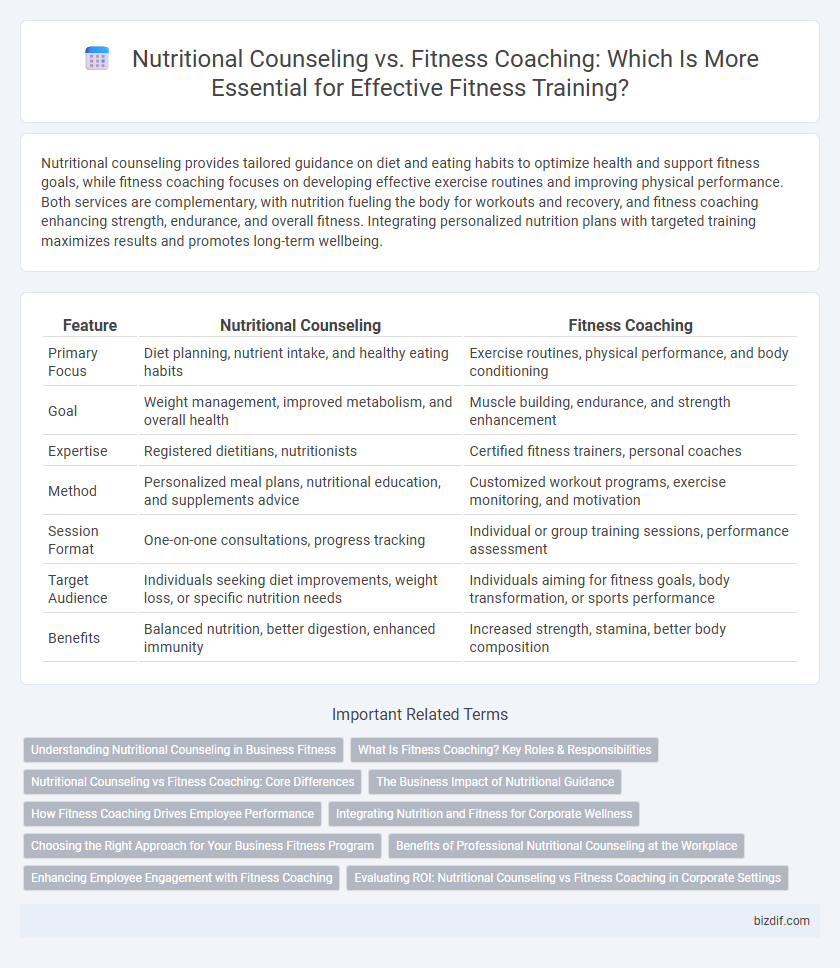Nutritional counseling provides tailored guidance on diet and eating habits to optimize health and support fitness goals, while fitness coaching focuses on developing effective exercise routines and improving physical performance. Both services are complementary, with nutrition fueling the body for workouts and recovery, and fitness coaching enhancing strength, endurance, and overall fitness. Integrating personalized nutrition plans with targeted training maximizes results and promotes long-term wellbeing.
Table of Comparison
| Feature | Nutritional Counseling | Fitness Coaching |
|---|---|---|
| Primary Focus | Diet planning, nutrient intake, and healthy eating habits | Exercise routines, physical performance, and body conditioning |
| Goal | Weight management, improved metabolism, and overall health | Muscle building, endurance, and strength enhancement |
| Expertise | Registered dietitians, nutritionists | Certified fitness trainers, personal coaches |
| Method | Personalized meal plans, nutritional education, and supplements advice | Customized workout programs, exercise monitoring, and motivation |
| Session Format | One-on-one consultations, progress tracking | Individual or group training sessions, performance assessment |
| Target Audience | Individuals seeking diet improvements, weight loss, or specific nutrition needs | Individuals aiming for fitness goals, body transformation, or sports performance |
| Benefits | Balanced nutrition, better digestion, enhanced immunity | Increased strength, stamina, better body composition |
Understanding Nutritional Counseling in Business Fitness
Nutritional counseling in business fitness focuses on personalized dietary guidance designed to enhance employee health, productivity, and overall wellness. It involves analyzing individual eating habits and creating tailored nutrition plans that complement physical fitness routines, thereby reducing workplace health risks and absenteeism. This targeted approach supports sustainable lifestyle changes, directly impacting business outcomes through improved employee performance and reduced healthcare costs.
What Is Fitness Coaching? Key Roles & Responsibilities
Fitness coaching involves personalized guidance aimed at improving an individual's physical performance, health, and overall well-being through tailored exercise plans and motivation. Key roles of fitness coaches include developing customized workout programs, tracking progress, providing motivation, and educating clients on proper exercise techniques. They focus primarily on physical activity optimization, contrasting with nutritional counseling, which centers on dietary habits and nutritional intake.
Nutritional Counseling vs Fitness Coaching: Core Differences
Nutritional counseling primarily targets diet optimization, focusing on individualized meal planning, macronutrient balance, and addressing specific health conditions through nutrition. Fitness coaching emphasizes exercise programming, physical performance improvement, strength training, and overall movement efficiency. The core difference lies in nutritional counseling's diet-centric approach versus fitness coaching's exercise-centric methodology to enhance health and fitness outcomes.
The Business Impact of Nutritional Guidance
Nutritional counseling drives business growth by improving client retention through personalized diet plans that enhance workout results, leading to higher customer satisfaction and referral rates. Integrating nutritional guidance into fitness coaching increases overall program effectiveness, boosting perceived value and allowing businesses to charge premium rates. Data shows that clients receiving tailored nutrition advice report faster progress and greater loyalty, directly impacting revenue streams for fitness enterprises.
How Fitness Coaching Drives Employee Performance
Fitness coaching enhances employee performance by creating personalized exercise programs that boost strength, endurance, and mental focus, directly supporting productivity and reducing absenteeism. It incorporates goal-setting strategies and progress tracking, fostering motivation and accountability for sustained lifestyle changes. Integrating fitness coaching into corporate wellness initiatives leads to improved energy levels and reduced stress, contributing to higher workplace engagement and overall performance.
Integrating Nutrition and Fitness for Corporate Wellness
Integrating nutritional counseling with fitness coaching enhances corporate wellness by addressing both dietary habits and physical activity, leading to improved employee health and productivity. Tailored nutrition plans combined with personalized fitness programs support weight management, stress reduction, and chronic disease prevention. Collaborative strategies foster sustainable lifestyle changes, reducing healthcare costs and boosting workplace morale.
Choosing the Right Approach for Your Business Fitness Program
Selecting the right approach for your business fitness program depends on the specific needs of your clients and organizational goals. Nutritional counseling emphasizes personalized dietary strategies to enhance health and performance, while fitness coaching focuses on tailored exercise routines and physical conditioning. Integrating both services can maximize client results by addressing comprehensive wellness from nutrition to physical activity.
Benefits of Professional Nutritional Counseling at the Workplace
Professional nutritional counseling at the workplace enhances employee health by providing tailored dietary guidance based on individual needs, leading to improved energy levels and productivity. Unlike general fitness coaching, nutritional counseling addresses specific nutritional deficiencies and promotes sustainable eating habits that support overall wellness. Implementing workplace nutritional programs reduces healthcare costs and absenteeism while fostering a culture of well-being and preventive care.
Enhancing Employee Engagement with Fitness Coaching
Fitness coaching significantly enhances employee engagement by integrating personalized workout plans that align with individual health goals and workplace wellness programs. Unlike nutritional counseling, which primarily focuses on diet and meal planning, fitness coaching offers dynamic motivation and real-time feedback to increase physical activity and boost morale. Companies investing in fitness coaching report higher productivity and lower absenteeism, highlighting its effectiveness in fostering a healthier, more engaged workforce.
Evaluating ROI: Nutritional Counseling vs Fitness Coaching in Corporate Settings
Evaluating ROI in corporate settings reveals that nutritional counseling enhances employee productivity and reduces healthcare costs by addressing diet-related issues directly, resulting in a measurable decrease in sick days and medical claims. Fitness coaching drives physical activity improvements and boosts morale, leading to increased engagement and reduced absenteeism, though often with less immediate quantifiable cost savings. Combining both approaches maximizes return by targeting both diet and exercise, which comprehensively improves overall employee health and workplace performance metrics.
Nutritional Counseling vs Fitness Coaching Infographic

 bizdif.com
bizdif.com